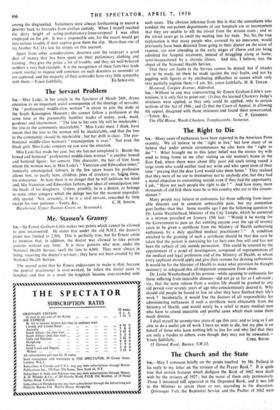The Servant Problem
S1R.—Miss Laski, in her article in the Spectator of March 24th, draws attention to an important social consequence of the shortage of servants. The " professional middle-class woman" is about to join the dodo in the South Kensington Museum ; she cannot follow a profession at the same time as the presumably humbler trades of nanny, cook, maid, gardener and charwoman. "The loss to her own life will be intolerable ; the loss to the community incalculable." Miss Laski must, I think, have meant that the loss to the woman will be incalculable, and that the loss to the community should be intolerable ; but her drift is-clear. The pro- fessional middle-class woman's "emancipation is over." Not even the black girls Miss Laski conjures up can save the situation.
Miss Laski has made her case, but she has not completed it. Beside the bowed and battered " professional middle-class woman" is another bowed and battered figure: her consort. This character, the heir of him from whom the woman was, in Miss Laski's "Victorian and Edwardian times," ironically emancipated, labours, in the few spare hours his profession allows him, to pacify hens, children, .piles of crockery or, failing these, his conscience. At least there is no danger that he will cultivate his mind and, like Victorian and Edwardian fathers, put ideas of emancipation into the heads of his daughters. Unless, possibly, he is a dentist, or belongs to some other category which the deluge has-for the moment unpredict- ably spared. Not, certainly, if he is a civil servant, rewarded by little
except his own patience.—Yours, &c., C. H. SISSON. Hazelwood, Upper Dunton Green, nr. Sevenoaks.






































 Previous page
Previous page